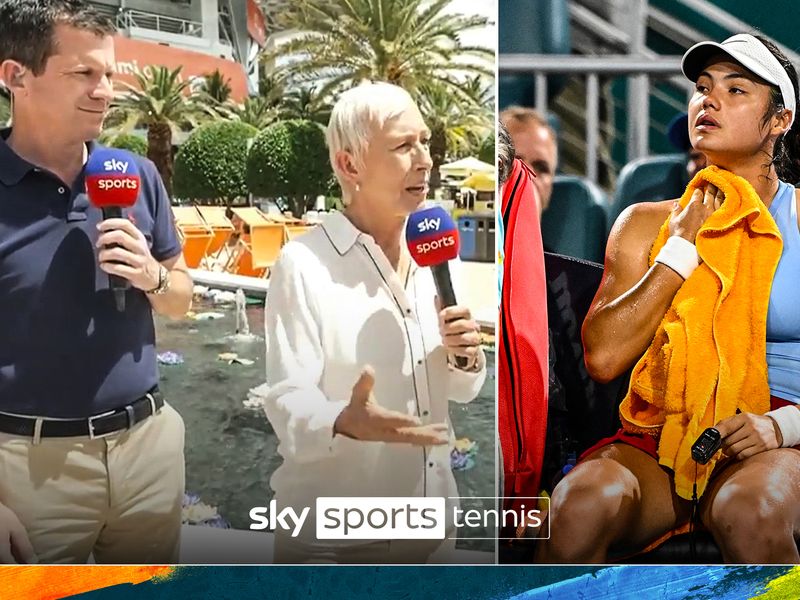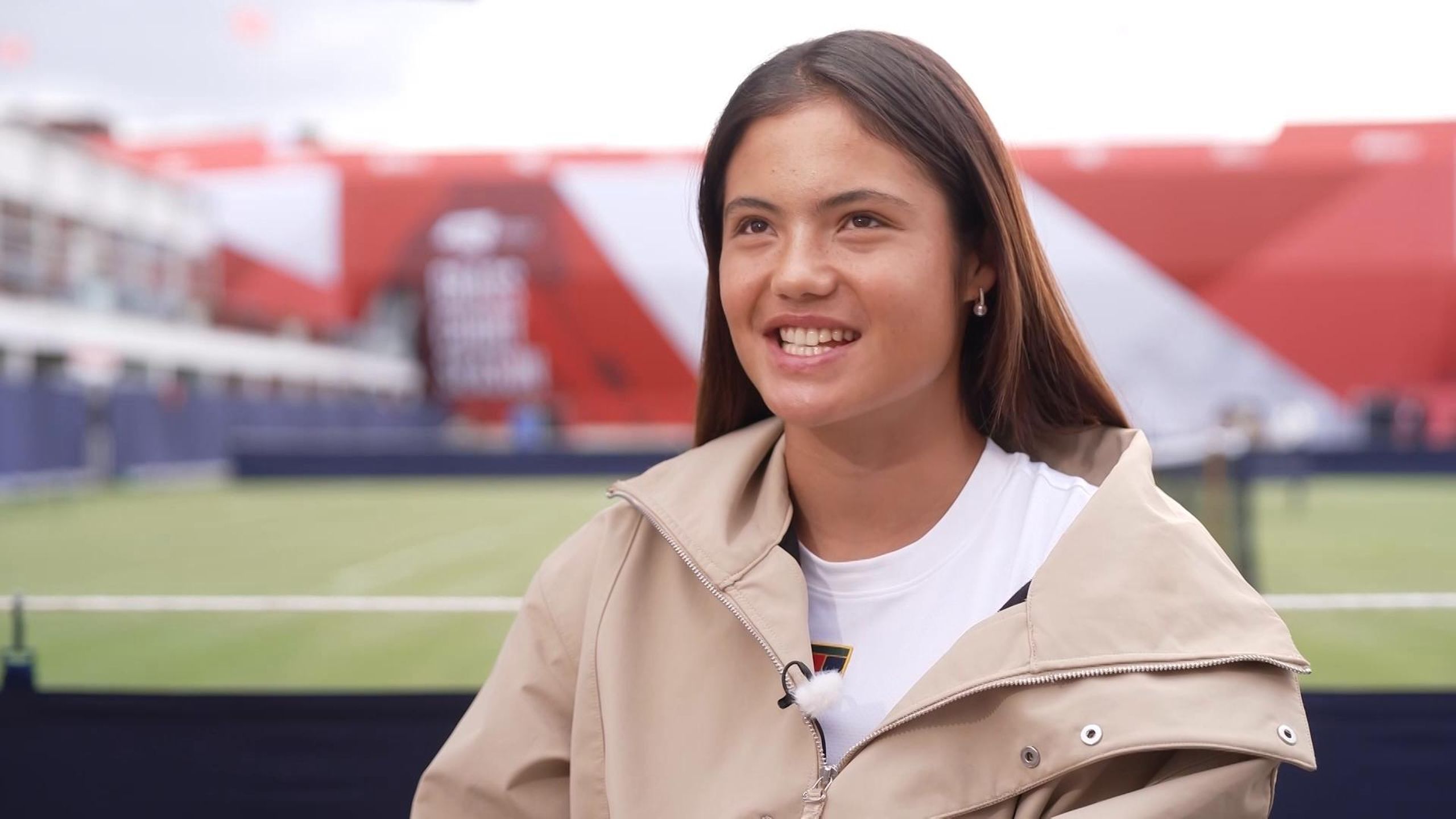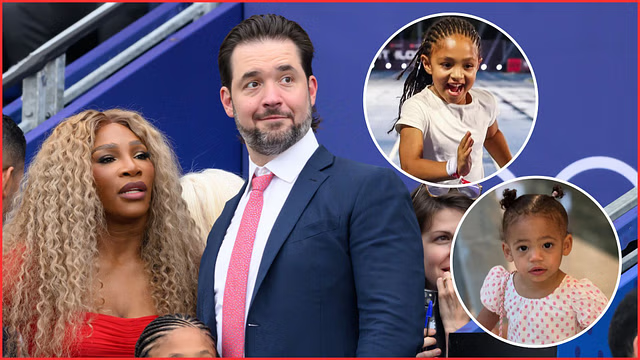The Coaching Carousel: Emma Raducanu’s Uncertain Path
British tennis sensation Emma Raducanu continues to navigate the unpredictable waters of the WTA Tour, but one issue seems to persist—her coaching situation. Following her early exit at the Miami Open, tennis legend Martina Navratilova has weighed in, urging Raducanu to establish a stable coaching team to realize her immense potential.

Since her historic US Open 2021 triumph, Raducanu has undergone frequent coaching changes, a pattern that has left many questioning whether the revolving door of mentors is hindering her progress. With Navratilova’s latest comments amplifying the conversation, is it finally time for Raducanu to settle down with a long-term coaching team?
A Rollercoaster Ride Since New York Glory
Emma Raducanu stunned the world in 2021 when she won the US Open as a qualifier, a feat never seen before in the history of tennis. She played with fearless aggression, remarkable composure, and tactical intelligence beyond her years. However, what followed has been a turbulent journey marked by injuries, inconsistent form, and a lack of continuity in her coaching staff.
Since lifting the trophy at Flushing Meadows, Raducanu has parted ways with multiple coaches, including Andrew Richardson, who guided her to that fairytale triumph. Subsequent hires, such as Torben Beltz and Dmitry Tursunov, came and went, leaving Raducanu in a constant state of transition. While she has cited the need to explore different coaching philosophies, this lack of stability may be costing her crucial development time.
Martina Navratilova’s Perspective: A Call for Stability
Tennis icon Martina Navratilova, an 18-time Grand Slam singles champion, is among those urging Raducanu to make a decisive move regarding her coaching setup. Speaking after the Miami Open, where Raducanu suffered another disappointing defeat, Navratilova emphasized the need for consistency in leadership and training structure.
“She has all the tools, but she needs to get her house in order with a proper coaching team,” Navratilova remarked. “You can’t keep changing coaches every few months and expect to build a long-term winning strategy. Tennis is a sport of small margins, and stability is crucial for confidence and improvement.”
Navratilova’s words carry significant weight, considering her unparalleled experience and understanding of the sport. Her comments reflect the growing sentiment among fans and analysts that Raducanu’s talent needs structured guidance to flourish fully.
The Challenges of Finding the Right Coach
Selecting the right coach is no easy task, particularly for a young player under immense media scrutiny. Raducanu has frequently spoken about her desire to explore various coaching styles, but this experimental approach may be preventing her from forging a lasting player-coach relationship.
Some key challenges include:
- Compatibility: A coach needs to align with Raducanu’s playing style and mentality.
- Pressure & Expectations: Working with a Grand Slam champion comes with immense pressure.
- Injury Management: Frequent coaching changes may lead to inconsistent training methods, affecting injury prevention and recovery.
- Tactical Growth: Without a long-term coach, strategic development can stagnate.
Many elite players—Serena Williams with Patrick Mouratoglou, Novak Djokovic with Marian Vajda, and Rafael Nadal with Toni Nadal and Carlos Moyá—have thrived under stable coaching relationships. Raducanu could benefit from a similar approach.
Potential Coaching Candidates for Raducanu
If Raducanu decides to heed Navratilova’s advice, who could be the ideal coach to guide her career? A few names come to mind:
1. Darren Cahill
A highly respected coach, Cahill has worked with Simona Halep, Andre Agassi, and Lleyton Hewitt. His tactical expertise and ability to develop young players could benefit Raducanu.
2. Carlos Rodríguez
The longtime coach of Justine Henin, Rodríguez specializes in mental resilience and aggressive shot-making, two qualities that would complement Raducanu’s game.
3. Wim Fissette
Having worked with Naomi Osaka, Kim Clijsters, and Victoria Azarenka, Fissette has a strong track record of guiding female players to Grand Slam success.
4. Martina Navratilova Herself?
Could Raducanu look to Navratilova as a mentor? The 18-time major winner’s insights on attacking tennis and mental fortitude would be invaluable.
The Psychological Impact of Coaching Instability
Beyond technical skills, a stable coach can provide psychological reassurance. Tennis is as much a mental game as it is physical, and Raducanu’s frequent changes could be undermining her confidence. Players often develop strong emotional connections with their coaches, and constant changes can lead to self-doubt, lack of trust, and inconsistency in match play.
Raducanu has spoken about dealing with the pressures of being in the spotlight, and a long-term coach could help manage the psychological demands of elite-level tennis. Having someone in her corner who understands her game intimately can be a game-changer in high-pressure matches.
The Road Ahead: A Defining Year for Raducanu
2024 is shaping up to be a make-or-break season for Raducanu. She remains one of Britain’s brightest tennis prospects, but with emerging stars like Coco Gauff, Leylah Fernandez, and Iga Świątek asserting dominance, Raducanu needs to establish a solid foundation for sustained success.
Her Miami Open exit serves as a wake-up call. To compete consistently at the top level, Raducanu must prioritize stability over experimentation. Whether she decides to take Navratilova’s advice and commit to a long-term coach remains to be seen, but the tennis world will be watching closely.

Final Thoughts: Time for a Bold Decision
Emma Raducanu’s talent is undeniable, but without a structured coaching setup, she risks missing out on her full potential. Martina Navratilova’s call for stability is not just a critique but a roadmap to success.
The British star has the ability to return to Grand Slam-winning form, but first, she must solve the puzzle of her coaching situation. Whether she chooses an experienced mentor or a fresh voice, one thing is clear: the time for uncertainty is over.
What’s Next for Emma Raducanu?
Will Raducanu finally commit to a long-term coach? Will she bounce back stronger in upcoming tournaments? As her journey unfolds, tennis fans eagerly await the next chapter in this compelling saga.
One thing is for sure—stability breeds success, and if Raducanu wants to reclaim her place among the sport’s elite, she must make a bold, definitive choice. The clock is ticking.


